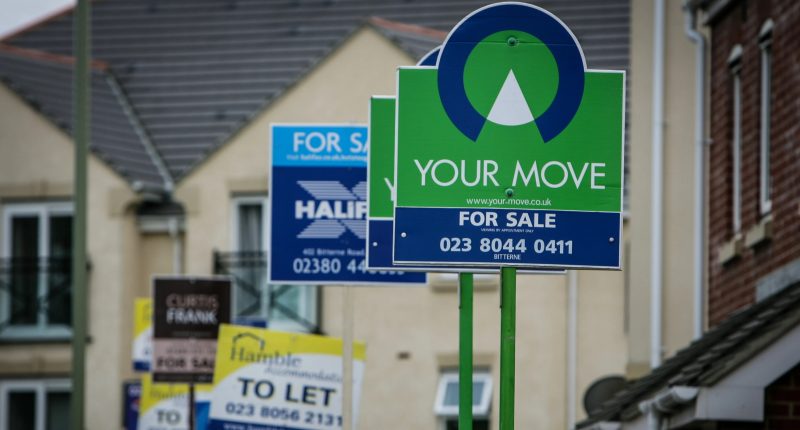IF you’re looking to move home, or get a foot on the property ladder, it’s only right to be curious about what could happen to house prices.
It is impossible to say what will happen to property prices in the future, but some things can indicate where the market is heading.
The cost of getting a mortgage can have a major impact, as higher interest rates mean it’s more expensive to own a home.
This in turn can pull property prices down as buyers don’t have as much money to spend.
Mortgage rates tend to echo the Bank of England’s base rate, which influences how much interest banks charge on loans or pay out for savings.
The current rate remains at 5.25% after four consecutive meetings.
READ MORE IN MONEY
The Bank of England said that the number of mortgage approvals made to home buyers jumped to the highest level since October 2022 in January this year.
HM Revenue and Customs (HMRC) figures showed this week that 82,000 home sales took place in January, which was 12% lower than January 2023 and 2% higher than December 2023.
But some lenders increased rates in February as uncertainty around Bank of England interest rate cuts clouded the outlook.
The other major factor in house prices is how secure workers feel in their jobs.
Most read in Money
What help is out there for first-time buyers?
GETTING on the property ladder can feel like a daunting task but there are schemes out there to help first-time buyers have their own home.
Help to Buy Isa – It’s a tax-free savings account where for every £200 you save, the Government will add an extra £50. But there’s a maximum limit of £3,000 which is paid to your solicitor when you move. These accounts have now closed to new applicants but those who already hold one have until November 2029 to use it.
Help to Buy equity loan – The Government will lend you up to 20% of the home’s value – or 40% in London – after you’ve put down a 5% deposit. The loan is on top of a normal mortgage but it can only be used to buy a new build property.
Lifetime Isa – This is another Government scheme that gives anyone aged 18 to 39 the chance to save tax-free and get a bonus of up to £32,000 towards their first home. You can save up to £4,000 a year and the Government will add 25% on top.
Shared ownership – Co-owning with a housing association means you can buy a part of the property and pay rent on the remaining amount. You can buy anything from 25% to 75% of the property but you’re restricted to specific ones.
Mortgage guarantee scheme – The scheme opens to new 95% mortgages from April 19 2021. Applicants can buy their first home with a 5% deposit, it’s eligible for homes up to £600,000.
When there’s a worry that companies could make redundancies, people tend not to make big financial commitments.
That means fewer people looking to buy homes, leaving sellers with fewer offers on their properties.
This is known as a buyer’s market because if sellers need to move, they can be forced to accept a lower price.
If that starts happening everywhere – average house prices start to come down.
Below, we take a look at what could happen to house prices over the course of the year.
House prices
There are several different house price trackers, all of which measure something slightly different.
The official measure comes from the Office for National Statistics, which looks at the prices homes have actually sold for after they go onto the Land Register.
This is the most accurate of all the indices but the figures come out three months after the homes are sold so there’s a big time lag.
Rightmove, Halifax and Nationwide all publish a monthly index, tracking the average prices of homes they provide mortgages on.
While they do adjust their figures to iron out big outliers, both lenders measure average house prices based on the properties they see.
House prices now
Across the UK, property values increased by 1.2% annually in February, following a 0.2% fall in January, Nationwide Building Society said.
It marked the first month since January 2023 that Nationwide recorded positive annual growth in house prices. In that month, there was a 1.1% year-on-year increase.
On a month-on-month basis, house prices increased by 0.7% in February, taking the average UK house price to £260,420.
Meanwhile, Rightmove said the average price tag on a home jumped by more than £3,000 month-on-month in February.
Across Britain, the average new seller asking price increased by 0.9% or £3,091 this month to £362,839.
The average asking price is also up by 0.1% compared with a year earlier, following a period of annual falls in every month since August 2023.
Rightmove said properties that are over-priced are being left on the shelf by price-sensitive buyers.
The website’s analysis indicates that sellers who price correctly initially are far more likely to find a buyer and sell their property faster.
Meanwhile, Zoopla expects house prices to fall by 2% in 2024 across the UK, but exactly how this affects individual UK homeowners will depend on the location.
Are house prices likely to go down in 2024?
It’s impossible to predict what will happen to house prices in 2024 as there are so many factors involved.
Sarah Coles, head of personal finance at Hargreaves Lansdown, said: “As average house prices rise back over £260,000 it raises another problem, because higher house prices, coupled with rising mortgage rates, risk pushing property out of reach for buyers again.”
Iain McKenzie, chief executive of the Guild of Property Professionals, said: “We’re expecting to see the housing market back on the march this year, and a return to postive annual price growth is another good sign.
“Growth will be welcomed by sellers that have been cautious to stick out the ‘for sale’ signs since prices began to ease.”
Meanwhile, Nick Mendes, technical manager at John Charcol mortgage advisers, said sellers will still need to price competitively.
He added: “Mortgage rates have steadily reduced, first time buyers and home movers are now reengaging with the market.
“Those who held back due to previous concerns now see it as the perfect time to make the move.
READ MORE SUN STORIES
“But it is important to stress though that we are seeing two types of sellers – those that pricing their property competitively in line with market conditions and those that are still holding out for the highs of 2022.
“It’s important for sellers to be price sensitive but not to put off potential buyers.”
Do you have a money problem that needs sorting? Get in touch by emailing [email protected].
Plus, you can join our Sun Money Chats and Tips Facebook group to share your tips and stories.









